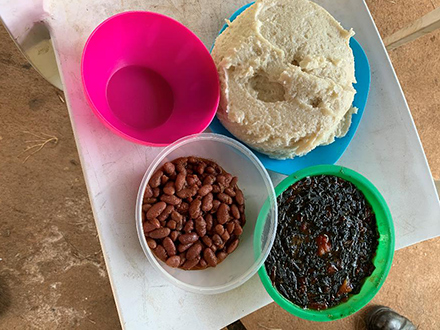Volunteer Report “My thoughts going to Japan from Malawi”
2023.09.06
Name: Ryuya Sakamoto
Specialty: Environmental Education
Usually, when we come across a situation that we have never experienced, we try to check it against our own experiences in the past, don’t we? In this time, I realize that I was subconsciously 'comparing'. Needless to say, since I came to Malawi a year and a half ago, in all aspects of my daily life –but for me, they are extraordinary–, I have been comparing Malawi and Japan.
Actually, my life in Lilongwe, where is the capital of Malawi, is not different so much from that in Japan in terms of richness of daily goods. However, the majority of Malawians live simple life. When I talk with them, although they are talkative at first, the conversation often shifts to poverty in Malawi and their own money problems. In their daily lives, they are trying to reduce their financial burdens. From personal observation, it seems to be very various that the range of things they can do themselves. I guess that the range of their abilities is broadened by helping their family do housework from childhoods and by growing up with observation to their parents working. In addition, by growing up in their community where neighbors, friends, their family and relatives communicate closely and support each other, they have a place of their own and they are not alone. Because of these backgrounds, their spirits are happy even if they can’t afford to buy many things. I believe that this is linked to their ability to solve problems and overcome obstacles, in other words, their 'toughness for survival'.
How about is Japanese people today? We can buy anything on the Internet. Even our communications are completed on screens of cell phones. It is ironic that our minds are not rich, despite the abundance of materials for life. And how poor my imagination was when I believed that we would never be happy without them. It should be only me those who think what would happen if one day we suddenly could not get anything which we need to live... But please imagine this situation. I’m afraid Japan where modern Japanese people, who seem to lack their 'toughness for survival', is going hungry, both physically and mentally. Of course, I believe this to be a nasty joke.
This Malawian’s 'toughness for survival' fascinate me, however, I have suspected my much richer life than many Malawians. Also, I have often wondered about the meaning of my existence in Lilongwe Water Board (LWB), because my activities are not monetary or productive for LWB. However, every time Malawians gently helped me, I refreshed my negative mind and determined to give something that I can do to Malawi little by little, even if it was only a tiny thing.
I had waited for about two years due to the COVID-19 outbreak before being sent to Malawi. However, the life in Malawi have become a page that I will never forget in the book named “my life”, and the reversed images of 'poverty' and 'happiness' with comparing Malawi and Japan have drawn as spectacular colors on that page, and shined brightly. This is the true flavor which only JOCV can taste through their working, and an invaluable and unpurchasable experience. Even if I consider my waiting period, I could get back an unexpected amount of change.
A Malawian told me a Malawian proverb 'Masiku amathera kuchiseko'. This direct meaning is "Doors are closed by people very soon", which can be translated as "Time passes quickly". Anyway, I have only less than 6 months to go back Japan. I will always keep in mind that I am now in Malawi, not Japan, and I want to run through until I return home without any regrets. I would like to thank all the Malawian and Japanese people who were involved in my dispatch and activities in Malawi half a year ahead of my return, in this report to Japan from Malawi.

With synchronous volunteers & language teacher

At the education subcommittee

Kamuzu DamⅡ

Malawi's staple food nsima and side dishes
scroll